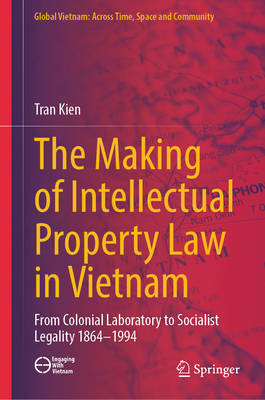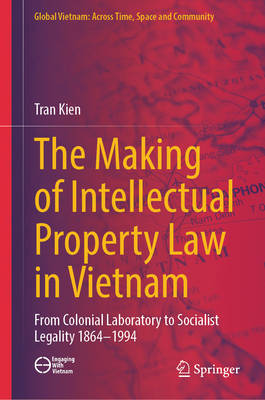
- Retrait gratuit dans votre magasin Club
- 7.000.000 titres dans notre catalogue
- Payer en toute sécurité
- Toujours un magasin près de chez vous
- Retrait gratuit dans votre magasin Club
- 7.000.0000 titres dans notre catalogue
- Payer en toute sécurité
- Toujours un magasin près de chez vous
The Making of Intellectual Property Law in Vietnam
From Colonial Laboratory to Socialist Legality 1864 - 1994
Tran Kien
213,95 €
+ 427 points
Description
This book is about the making of intellectual property law in Vietnam across colonial and socialist space and time from 1864 to 1994. It provides a completely new, provoking narrative, disproving previously published scholarship which claimed that there was no intellectual property law in Vietnam during the colonial and socialist periods. In doing so, the book engages with an emerging field of historiographical inquiry into the intellectual property law history in Vietnam and worldwide, which investigates how and why the scholarship about the history of intellectual property law has been construed and framed as such within a specific period and space. This book is comprised of three knowledge components. The first involves the reconstruction of the lost intellectual property law from 1864 to 1994 in Vietnam doctrinally. Relying on newly discovered archives in Vietnam and worldwide, it unravels a corpus of statutory and regulatory provisions and interesting, at times contradictory, juridical decisions that governed and interpreted copyright, patent, and trademark. The second is the historiographical inquiry of the making of the intellectual property law history scholarship in Vietnam. This will answer the questions of how and why the particular histories had been construed and framed as such at a particular time. This involves the debate about sociopolitical ideologies underlying the meaning and application of the laws, most notably colonialism and socialism. Finally, the third engages with the theory of legal transplantation. It addresses a hypothetical question of colonial laboratory as a form of legal transplantation: a new concept that this book offers to the global scholarship. It demonstrates that the colonial empire had tried to use Vietnam as a laboratory for its legal reform and then transplanted the successful and feasible results back to the empire. This book explains the distinctively ideological principles underlying the understanding and application of the law.
Spécifications
Parties prenantes
- Auteur(s) :
- Editeur:
Contenu
- Nombre de pages :
- 237
- Langue:
- Anglais
- Collection :
Caractéristiques
- EAN:
- 9789819697854
- Date de parution :
- 04-09-25
- Format:
- Livre relié
- Format numérique:
- Genaaid
- Dimensions :
- 156 mm x 234 mm
- Poids :
- 566 g

Les avis
Nous publions uniquement les avis qui respectent les conditions requises. Consultez nos conditions pour les avis.






